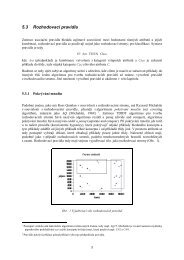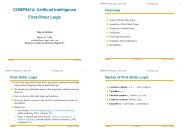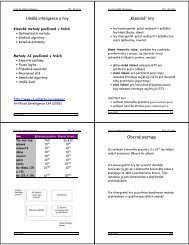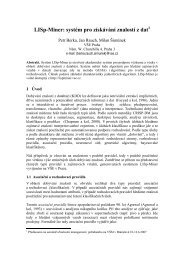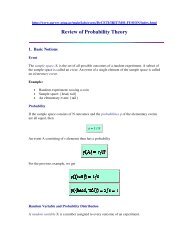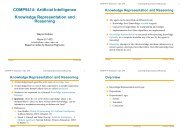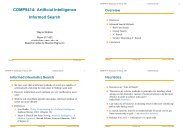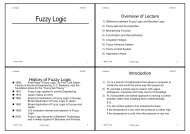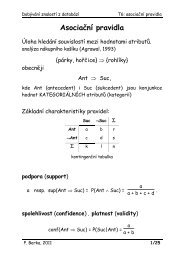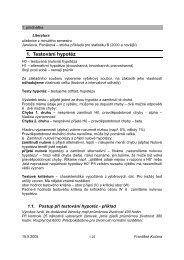LECTURE 4: PRACTICAL REASONING 1 Practical ... - Sorry
LECTURE 4: PRACTICAL REASONING 1 Practical ... - Sorry
LECTURE 4: PRACTICAL REASONING 1 Practical ... - Sorry
You also want an ePaper? Increase the reach of your titles
YUMPU automatically turns print PDFs into web optimized ePapers that Google loves.
Lecture 4<br />
An Introduction to Multiagent Systems<br />
Lecture 4<br />
An Introduction to Multiagent Systems<br />
¯What is a plan?<br />
A sequence (list) of actions, with variables replaced by constants.<br />
4 Implementing <strong>Practical</strong> Reasoning Agents<br />
¯Afirst pass at an implementation of a practical reasoning agent:<br />
Agent Control Loop Version 1<br />
1. while true<br />
2. observe the world;<br />
3. update internal world model;<br />
4. deliberate about what intention<br />
to achieve next;<br />
5. use means-ends reasoning to get<br />
a plan for the intention;<br />
6. execute the plan<br />
7. end while<br />
¯(We will not be concerned with stages (2) or (3).)<br />
http://www.csc.liv.ac.uk/˜mjw/pubs/imas/ 20<br />
http://www.csc.liv.ac.uk/˜mjw/pubs/imas/ 21<br />
Lecture 4<br />
An Introduction to Multiagent Systems<br />
Lecture 4<br />
An Introduction to Multiagent Systems<br />
¯Problem: deliberation and means-ends reasoning processes are<br />
not instantaneous.<br />
They have a time cost.<br />
¯Suppose the agent starts deliberating t¼, begins means-ends<br />
reasoning at t½, and begins executing the plan at time t¾.<br />
Time to deliberate is<br />
t deliberatet½ t¼<br />
and time for means-ends reasoning is<br />
t met¾ t½<br />
¯Further suppose that deliberation is optimal in that if it selects<br />
some intention to achieve, then this is the best thing for the<br />
agent. (Maximises expected utility.)<br />
¯So at time t½, the agent has selected an intention to achieve that<br />
would have been optimal if it had been achieved at t¼.<br />
But unless t deliberate is vanishingly small, then the agent runs the<br />
risk that the intention selected is no longer optimal by the time<br />
the agent has fixed upon it.<br />
This is calculative rationality.<br />
¯Deliberation is only half of the problem: the agent still has to<br />
determine how to achieve the intention.<br />
http://www.csc.liv.ac.uk/˜mjw/pubs/imas/ 22<br />
http://www.csc.liv.ac.uk/˜mjw/pubs/imas/ 23



